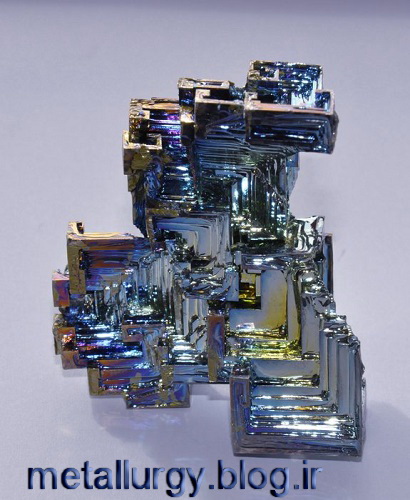
Semi-metallic bismuth crystal used in thermoelectric compounds (Credit: ESA).
2 September 2014
European
industry has decided to ‘put the pedal to the metal’, by creating the
world's largest research consortium in the field of metals research and
manufacturing. Media are invited to learn about the new programme in a
press conference at London’s Science Museum on 9 September.
Aptly called Metallurgy Europe, the R&D programme will be funded to the tune of one billion euros over seven years.
The
programme has recently been selected as a new Eureka Cluster, and it
will now integrate the skills, ingenuity and energy of over 170
companies and laboratories from across 20 countries.
Some of the
largest engineering companies in Europe have joined forces, including
the likes of Airbus Group, BP, Siemens, Daimler, Rolls-Royce, BMW,
Thales, AvioAero, PSA Group, BAE Systems, Philips, Ruag, Sener,
Bombardier, OHB Systems, Linde Group, ESI, Rolex, Richemont,
ArcelorMittal, Sandvik, Bruker, SKF, Johnson Matthey, Tata Steel, GKN,
Boston Scientific, ThyssenKrupp, Outokumpu, Haldor Topsøe and Fiat to
name just a few of the major players on board.
Over 60 small and medium-sized companies are also teaming up.
ESA,
and a number of European organisations such as the European Synchrotron
Radiation Facility (ESRF), the Institut Laue Langevin (ILL), the
European Powder Metallurgy Association (EPMA) and the Culham Centre for
Fusion Energy (CCFE-ITER), are also providing their unique expertise and
innovation to this initiative.
Many breakthrough discoveries are
expected in this domain that could be worth billions of euros to the
European economy. Several tech start-ups and new factories have already
been created in preparation for the mass manufacturing of the new alloys
and products
"This new programme allows us to enter the high-tech
metals age," says Prof. David Jarvis, the Chairman of Metallurgy Europe
and Head of Strategic and Emerging Technologies at ESA.
"The top
management of industry have come together for the first time on this
important topic, and there is a confident feeling that Metallurgy Europe
will deliver many unique, exciting and profitable technologies,"
continues Prof. Jarvis.
The team believes that the programme has the
potential of creating over 100 000 new jobs in the materials,
manufacturing and engineering sectors.
